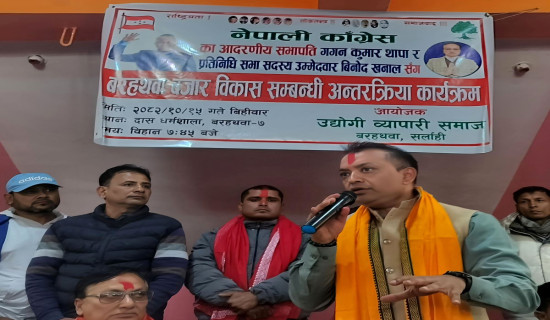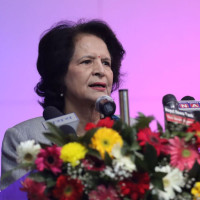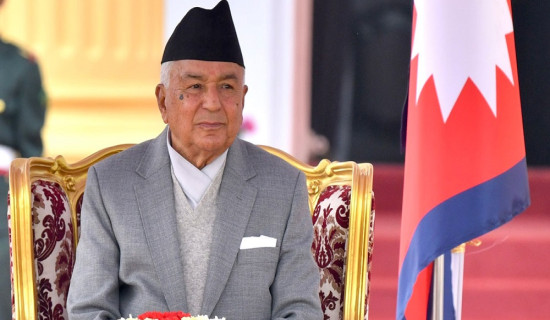- Friday, 30 January 2026
Nurture Constitutional Culture And Conduct
Nepal has over seven-decade-long constitutional history. Today we are experimenting the 7th constitution that is considered more comprehensive, progressive, democratic and inclusive compared to other national charters. One common trait of all constitutions is that they chronicle the outcomes new political upheavals – be it democratic or autocratic. In most cases, the constitutions are drafted to address the public aspirations for liberty, equality and dignity. Even the authoritarian rulers project themselves as democrats by unveiling the new statutes laden with oodles of promises and platitudes. For some, the statutes serve as smokescreens to hide their authoritarian motives and fulfil their parochial goals.
In 1948, Nepal saw the first constitution, which was known as antarim bidhan (interim statute) promulgated by Rana prime minister Padma Shumsher. It is interesting to note that Rana rulers agreed to introduce the constitution with limited democratic rights in a clear move to appease the growing revolt of people against their ironclad rule. But the statute could not be brought into force owing to some power cliques who pulled the strings behind the scenes. They thought the statute could forfeit their sweeping powers their dynasty has been enjoying for a century if it was implemented in letter and spirit.
The constitution is often described as the document of consensus among the existing political forces. It reflects the power balance and prevalent dynamics while seeking structural changes in the society. Desire for greater political reforms and economic transformations embed in the new constitution. All the constitutions except those promulgated in 1948 and 1962 were the products of democratic movements and struggles. The five constitutions introduced in 1951, 1959, 1990, 2007 and 2015 underpin fundamental of democratic values, norms and principles. Still, most of them went belly up much to the disappointment of people and freedom fighters.
Constitutional stability
As we are marking the Constitution Day today, it is imperative to ponder over as to why the country has become a laboratory to test one constitution after another with varied political orientations. Why is not there constitutional stability and consistency? Why do the extra-constitution methods often become decisive to frame the new charter? Why did the past statutes fail to deliver on its pledges and the parties rush to bring new charter without fully implementing the previous ones? The political parties, civil society members, media and experts must scratch their head to find plausible answers to these questions.
For instance, the 1990 constitution has envisioned a welfare state with multiparty system, constitutional monarchy and fundamental human rights. But there was conspicuous gap between the constitution’s vision and the economic policy adopted following the political change. There were systematic steps to weaken the state by privatising or selling the dozens of profit-running industries. This halted the industrialization process and the prospect of job creation in the manufacturing sector. The reckless privatisation drive and deregulation of economy did not promote industries on large scale. The economic policy, espoused under the prescription of the World Bank and IMF, failed to attain the desired economic growth for the average Nepalis who are are aspiring positive change in their daily life with the advent of the multiparty democracy. As the employment opportunities shrank at home, youths were forced to leave for foreign labour market to make better income.
Nepal’s experiment with neoliberalism has been disastrous. This was like putting the cart before the horse. Today over four million Nepalis are working as migrant workers in various countries, excluding India. The youths are the key force of economic development and social transformations. If the state does not care about them, how can the nation-building drive gathers steam? Our political and economic policy must address the plight of the citizens. The new federal constitution promulgated in 2015 has many provisions to bring about socio-economic transformations essential to overcome the structural inequality and injustice. It has capped the achievements of all past movements, providing a clear roadmap for the drastic change in the superstructure that includes politics, institutions, governance system and culture, among others. It has converted the country into secular, federal and republican state. Even at the base or substructure level, the statute envisages creating a socialism-oriented society. The base denotes the mode of production that includes the forces and relations of production, according to Marxist school of thought.
Capacity building
Building the capacity of state institutions remain a big challenge in realising the rosy provisions of constitution which incorporates many rights but fewer duties of the citizens. The state is obliged to fulfil altogether 31 fundamentals rights, but it does not have financial strength and mechanisms to this end. In a similar manner, it seeks to bring marginalised classes, communities and regions into the mainstream of politics and development. The decentralisation of powers, rights and resources between the federation, provinces and local governments is expected to enhance the participation of the grassroots in the decision-making level and deepen the inclusive democracy. The local bodies have been empowered to the extent that it can perform executive, judiciary and legislative duties. But most of the local units still lack political, legal and institutional capacity to execute its 22 exclusive rights in addition to other concurrent powers.
Eight years have elapsed since the promulgation of the national charter. It has become necessary to maintain political stability, good governance and rule of law vital for nurturing constitutional values and vision. By merely holding the periodic elections, statute is not institutionalised as expected. The political parties and their leaders must demonstrate constitutional norms, character and behaviour. The constitution is just a lifeless document, and it does not itself give wisdom to its followers.
It is up to the concerned stakeholders such as the government, political parties, court, parliament, media and civil society to show greater understanding and commitment to make constitution a live, dynamic and practical document, thereby translating its provisions into reality. May the Constitution Day inspire all to embrace its vision and spirit and act accordingly.
(The author is Deputy Executive Editor of this daily.)
















